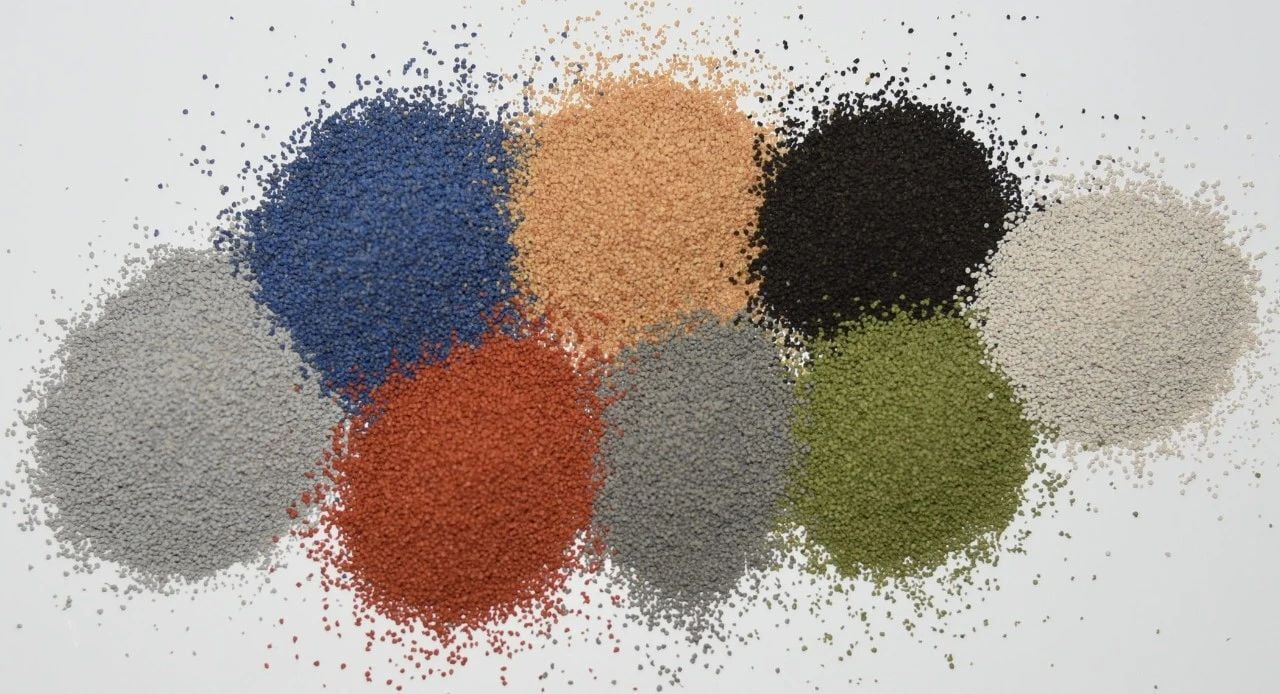BioPowder is a specialist in innovative fiber additives and functional composite fillers derived from the circular economy.
By converting olive oil by-products into high-quality powders with unique properties, such as excellent stability, homogeneous particle shape and bright color, they become natural fillers and reinforcing fibers ideally suited for composites.
A composite is a material consisting of two components with different physical and chemical properties. The combination of these two components ensures the reinforcing properties of the final compound.

Recently, there has been a strong trend towards manufacturing natural composites, i.e., natural materials with a reduced carbon footprint and better recyclability. Most manufacturers use natural and renewable materials, especially natural fillers and fiber composite additives, to replace synthetic components such as glass or plastic. The result is biocomposites (also known as natural composites), i.e. new materials that contain a percentage of natural and/or plant-based components.
Fiber additive made from recycled olive pits
In recent years, a variety of plant fiber additives have been used in composite manufacturing: wood fibers, starch, flax, hemp, corn cobs, bagasse, and coconut fiber, to name a few. Depending on the final application, these materials have their advantages and disadvantages. In addition to not always yielding satisfactory mechanical properties, many natural fillers are not necessarily sustainable, even though they are derived from herbs.
At BioPowder, many recycled feedstocks, i.e. agricultural tributaries, have been tested. Sustainability criteria and mechanical performance parameters were analyzed in a comparative manner. Bottom line:Refined, crushed olive kernels, a by-product of olive oil production, show the best performance, i.e. excellent results, due to their physical and chemical particle structure. As a result, its range of fully bio-based and biodegradable functional composite fillers was born.BioPowder fiber additives, marketed under the brand name Olea FP (Functional Powder), are an optimized solution made from sustainable raw materialsCompared to other plant-based fibers, these natural fillers and reinforcing fibers offer the following advantages.
High stability: Olivine powder does not swell in contact with liquids and retains its shape. Its particles can be customized to any size range and remain stable even under load.
Low water and oil absorption:Olea FP composite fillers do not change their shape or texture in oil or water-based formulations (e.g. coatings). As a result, they are easy-to-handle reinforcing fibers that guarantee predictable results.
Hardness and abrasion resistance: Composite additives made from ground olive pits have a hardness of 3.5 (Mohs). When used as reinforcing fibers in natural composites, BioPowder natural fillers can significantly increase the tensile strength, resistance and durability of the finished material. As fiber reinforcements in resins and/or polymer compounds, they improve the abrasion resistance of the final product and are therefore suitable for composites with a wide range of properties.
Light weight: Its fiber additive has a bulk density of 500-550 g/L and a specific gravity of 1.1-1.1 kg/L. It is an ideal natural filler for lightweight composite materials in aviation, shipbuilding, automotive and medical applications. Additionally, different types of performance coatings (water-based and bio-based) can be enhanced accordingly.
Various textural effects: This is achieved with custom-sized powdered and granular fiber additives and natural fillers. Fine powders are the solution for flat surfaces, while coarse particles add visible texture and anti-slip effect.
Environmental and Human Sustainability: BioPowder fiber additives are made entirely from side-stream products, i.e. upgraded agricultural residues. No planting and associated land and water use is required. This is particularly relevant for life cycle assessments (LCAs) of natural composites: most material developers are aware of the carbon footprint and/or CO2 balance of all input materials and are keen to evaluate their reinforcing fibers accordingly. The production of its composite fillers is completely emission-free and requires only a reasonable amount of electricity. The latter can come partly from renewable energy sources, such as solar panels or biomass boilers.
Proven examples of fiber additives in biocomposite applications
BioPowder composite fillers offer many advantages when used in composites for the following applications
Natural fillers and reinforcing fibers for rubber compounds
The company's Olea FP micropowder product line can add significant value to rubber compounds for tires, seals and hoses, shoe soles and similar items. Strength and stability can be improved when different dosages of fiber additives are added. In addition, microplastics produced by the wear and tear of rubber products (tyres, shoe soles, etc.) have an impact on the environment. ), can be significantly reduced when adding natural composite additives.
Fiber additives for PVC composites and linoleum
BioPowder natural fillers and reinforcing fibers can increase the strength, stability and wear resistance of PVC-based composite systems. In addition, they promote the development of ecological linoleum products with superior performance. Similar effects are possible when integrating its micronized composite filler into molded PVC components for various technical applications.
To improve existing PVC systems, BioPowder has launched an ultra-wear-resistant floor coating with hydrophobic properties. Its naturazzO resilient flooring solution contains up to 40% Olea FP composite filler and has proven effective on highly loaded industrial surfaces.
Fiber additives and natural fillers for engineered wood and plastics
BioPowder additive packages are designed to reinforce building materials made from engineered wood and reinforced plastics. Especially bioplastics, which are widely used in end products, as they can be reinforced with Olea FP fiber reinforcement solutions and natural fillers. In addition, when they are integrated into 3D printed filaments and textile fibers, new levels of performance and environmental sustainability can be achieved.
Reinforcing fibers for sealants and adhesives
Most sealants and adhesives are polymer formulations used to bond two different substrates. Traditionally, they are made from non-recyclable silicone or polyurethane. BioPowder natural fillers have been developed to increase the biobased content of existing sealant formulations while enhancing mechanical properties such as abrasion resistance and strength, and its additives for biobased composites are suitable for both one- and two-component systems and are available in both natural and hydrophobic grades.

